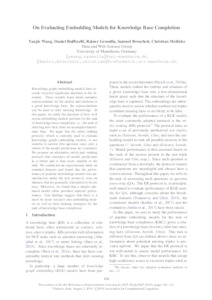|
On evaluating embedding models for knowledge base completion
Wang, Yanjie
;
Ruffiinelli, Daniel
;
Gemulla, Rainer
;
Broscheit, Samuel
;
Meilicke, Christian
![[img]](https://madoc.bib.uni-mannheim.de/52546/1.hassmallThumbnailVersion/On%20Evaluating%20Embedding%20Models%20for%20Knowledge%20Base%20Completion.pdf)  Vorschau |
|
PDF
On Evaluating Embedding Models for Knowledge Base Completion.pdf
- Veröffentlichte Version
Download (498kB)
|
|
URL:
|
https://madoc.bib.uni-mannheim.de/52546
|
|
Weitere URL:
|
https://arxiv.org/abs/1810.07180
|
|
URN:
|
urn:nbn:de:bsz:180-madoc-525462
|
|
Dokumenttyp:
|
Konferenzveröffentlichung
|
|
Erscheinungsjahr:
|
2019
|
|
Buchtitel:
|
The 4th Workshop on Representation Learning for NLP (RepL4NLP-2019) - proceedings of the workshop : August 2, 2019, Florence, Italy : ACL 2019
|
|
Seitenbereich:
|
104-112
|
|
Veranstaltungstitel:
|
RepL4NLP-2019
|
|
Veranstaltungsort:
|
Florence, Italy
|
|
Veranstaltungsdatum:
|
28.7.-2.8.2019
|
|
Herausgeber:
|
Augenstein, Isabelle
|
|
Ort der Veröffentlichung:
|
Florence, Italy
|
|
Verlag:
|
Association for Computational Linguistics
|
|
Verwandte URLs:
|
|
|
Sprache der Veröffentlichung:
|
Englisch
|
|
Einrichtung:
|
Fakultät für Wirtschaftsinformatik und Wirtschaftsmathematik > Practical Computer Science I: Data Analytics (Gemulla 2014-)
|
|
Lizenz:
|
 Creative Commons Namensnennung 4.0 International (CC BY 4.0)
Creative Commons Namensnennung 4.0 International (CC BY 4.0)
|
|
Fachgebiet:
|
004 Informatik
|
|
Abstract:
|
Knowledge graph embedding models have recently received significant attention in the literature. These models learn latent semantic representations for the entities and relations in a given knowledge base; the representations can be used to infer missing knowledge. In this paper, we study the question of how well recent embedding models perform for the task of knowledge base completion, i.e., the task of inferring new facts from an incomplete knowledge base. We argue that the entity ranking protocol, which is currently used to evaluate knowledge graph embedding models, is not suitable to answer this question since only a subset of the model predictions are evaluated. We propose an alternative entity-pair ranking protocol that considers all model predictions as a whole and is thus more suitable to the task. We conducted an experimental study on standard datasets and found that the performance of popular embeddings models was unsatisfactory under the new protocol, even on datasets that are generally considered to be too easy. Moreover, we found that a simple rule-based model often provided superior performance. Our findings suggest that there is a need for more research into embedding models as well as their training strategies for the task of knowledge base completion.
|
 | Dieser Eintrag ist Teil der Universitätsbibliographie. |
 | Das Dokument wird vom Publikationsserver der Universitätsbibliothek Mannheim bereitgestellt. |
 Suche Autoren in Suche Autoren in
BASE:
Wang, Yanjie
;
Ruffiinelli, Daniel
;
Gemulla, Rainer
;
Broscheit, Samuel
;
Meilicke, Christian
Google Scholar:
Wang, Yanjie
;
Ruffiinelli, Daniel
;
Gemulla, Rainer
;
Broscheit, Samuel
;
Meilicke, Christian
ORCID:
Wang, Yanjie, Ruffiinelli, Daniel, Gemulla, Rainer  ORCID: https://orcid.org/0000-0003-2762-0050 ORCID: https://orcid.org/0000-0003-2762-0050, Broscheit, Samuel and Meilicke, Christian  ORCID: https://orcid.org/0000-0002-0198-5396 ORCID: https://orcid.org/0000-0002-0198-5396
Sie haben einen Fehler gefunden? Teilen Sie uns Ihren Korrekturwunsch bitte hier mit: E-Mail
Actions (login required)
 |
Eintrag anzeigen |
|
|
 ORCID: https://orcid.org/0000-0003-2762-0050, Broscheit, Samuel and Meilicke, Christian
ORCID: https://orcid.org/0000-0003-2762-0050, Broscheit, Samuel and Meilicke, Christian  ORCID: https://orcid.org/0000-0002-0198-5396
ORCID: https://orcid.org/0000-0002-0198-5396



 Creative Commons Namensnennung 4.0 International (CC BY 4.0)
Creative Commons Namensnennung 4.0 International (CC BY 4.0)
 Suche Autoren in
Suche Autoren in